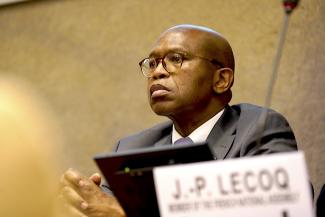
Geneva (Switzerland), December 11, 2024 (SPS) - At the inauguration of the international conference organized by the Geneva Support Group for Western Sahara, Ambassador Mxolisi Nkosi, Permanent Representative of South Africa to the UN Human Rights Council, delivered a powerful speech reaffirming South Africa's unwavering commitment to the self-determination of the Sahrawi people. This event commemorates the 64th anniversary of UN General Assembly Resolution 1514 (XV), which established a legal framework for the decolonization and independence of occupied territories.
In his address, Ambassador Nkosi highlighted that Western Sahara remains the last colonial territory in Africa, a situation he described as a painful reminder that decolonization remains an unfinished task. “Resolution 1514 (XV) emphasizes that the subjugation, domination, and exploitation of peoples constitutes a fundamental violation of human rights and is contrary to the principles of the UN Charter,” he stated.
The South African diplomat stressed that the situation in Western Sahara has been on the UN decolonization agenda for over 60 years, while Morocco's illegal occupation, now in its 49th year, continues to challenge both UN resolutions and international court rulings. He cited the 1975 Advisory Opinion of the International Court of Justice, which rejected any territorial link that could justify Moroccan sovereignty over Western Sahara, as well as recent decisions by the Court of Justice of the European Union that reinforce the territory's status as a decolonization issue and confirm that Morocco has no sovereign rights over its resources.
Ambassador Nkosi dedicated an emotional segment of his speech to honor the memory of Gilles Devers, a lawyer and tireless advocate for Sahrawi and Palestinian causes, who recently passed away. He highlighted Devers's role in the legal victories achieved in international courts. During the ceremony, a minute of silence was observed in his honor, and the work of his son, Manuel Devers, who continues his efforts supporting the POLISARIO Front, was recognized.
The South African representative urged member states to reaffirm their commitment to upholding international law and to work towards ensuring a self-determination referendum that allows the Sahrawi people to freely decide their future. He emphasized that the right to self-determination is the foundation of all other human rights and that its denial perpetuates serious violations against the Sahrawis.
Nkosi also denounced that the High Commissioner for Human Rights continues to face access restrictions to the occupied territory of Western Sahara, hindering the realization of an observation mission. He warned that such blockages by the Moroccan occupation regime, along with the inaction of some states, undermine both international law and the credibility of global institutions like the UN.
In his call to action, the diplomat urged that the situation in Western Sahara be returned to a prominent place on the UN agenda and that strategic platforms be identified to advance toward resolving the conflict. “We must recover the brave spirit of Resolution 1514 (XV) and ensure the end of the suffering of the Sahrawi people for the sake of all humanity,” he concluded.
With this intervention, South Africa reaffirms its role as one of the main allies of the Sahrawi Arab Democratic Republic (SADR). This commitment is framed within South Africa's historical values, having lived its own struggle against colonial oppression and apartheid, and considers the liberation of Western Sahara as an unavoidable moral and political responsibility.
The conference, which brings together legal experts, academics, human rights advocates, and diplomats, will continue to analyze the challenges and responsibilities of the international community in guaranteeing the self-determination of the Sahrawi people and ending decades of illegal occupation.